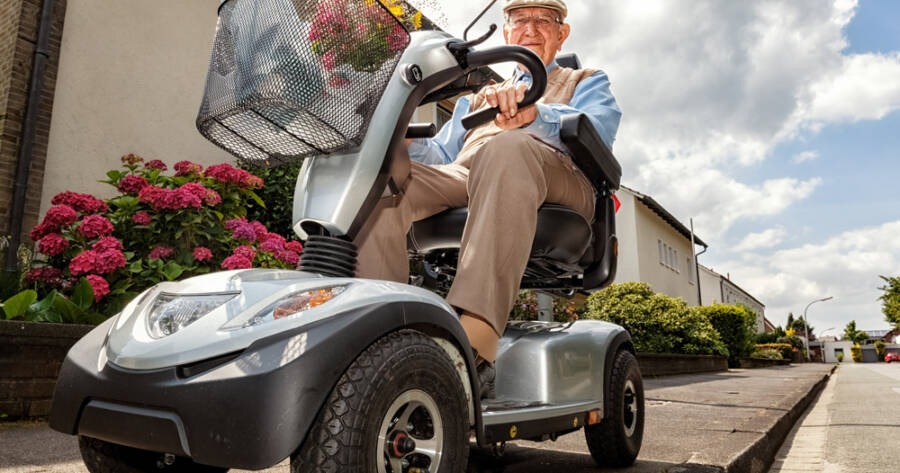Mobility scooters are invaluable for people facing challenges with mobility due to aging, disability, or health conditions. They can provide increased independence. However, the cost of these devices can be prohibitive for many. That’s where Medicare may offer assistance. Understanding Medicare’s coverage options for mobility scooters and the benefits scooters provide can help you make informed decisions about improving your quality of life.
What Are Mobility Scooters?
Mobility scooters are motorized devices designed to assist individuals who struggle to walk long distances. These scooters typically have a seat, handlebars, and three or four wheels for stability.
They are often used by individuals with conditions such as arthritis, chronic obstructive pulmonary disease (COPD), or other mobility-limiting health issues. Mobility scooters differ from wheelchairs in that they are better suited for outdoor use and are often more versatile in handling different terrains.
Understanding Medicare’s Role in Mobility Scooter Coverage
Medicare is a federal health insurance program primarily for individuals aged 65 and older, as well as some younger individuals with disabilities. While Medicare offers various benefits, coverage for mobility scooters falls under specific conditions and categories.
Part B: Durable Medical Equipment (DME)
Mobility scooters are classified as durable medical equipment (DME) under Medicare Part B. This part of Medicare covers certain medical supplies and equipment when prescribed by a doctor. However, coverage is not automatic and is subject to several requirements:
- Medical necessity: The scooter must be deemed medically necessary for the individual to perform daily tasks.
- Doctor’s prescription: A healthcare provider must prescribe the mobility scooter after evaluating the patient’s condition.
- Supplier approval: The equipment must be obtained from a Medicare-approved supplier to qualify for reimbursement.
Cost Considerations
If approved, Medicare typically covers 80% of the cost of the mobility scooter. The remaining 20% is the patient’s responsibility, along with any applicable deductibles. It is advisable to confirm coverage details with Medicare or a healthcare provider, as out-of-pocket expenses can vary depending on supplemental insurance or other factors.
How To Qualify for a Mobility Scooter Through Medicare
Meeting Medicare’s requirements for a mobility scooter involves several steps. While the process can vary depending on individual circumstances, the general pathway includes:
- Assessment by a doctor: The individual must undergo a face-to-face evaluation by a healthcare provider to determine whether a mobility scooter is necessary.
- Submission of documentation: The healthcare provider must submit documentation to Medicare, justifying the need for the equipment.
- Choosing a supplier: Once approved, the individual must select a supplier enrolled in Medicare to ensure coverage.
- Approval process: Medicare will review the documentation and decide whether to approve the claim.
It is important to note that approval is not guaranteed, even if all steps are completed. Factors such as medical history, condition severity, and adherence to Medicare’s guidelines can influence the outcome.
The Benefits of Mobility Scooters
While obtaining a mobility scooter through Medicare may require effort and documentation, the potential benefits can be life-changing for those who qualify.
Improved Independence
Mobility scooters enable users to regain a sense of autonomy, allowing them to navigate their homes and communities with greater ease. This can significantly enhance their ability to participate in social, recreational, and everyday activities.
Enhanced Safety
For individuals with limited mobility, attempting to walk unaided can increase the risk of falls and injuries. Mobility scooters provide a safer alternative, reducing physical strain and the likelihood of accidents.
Convenience and Comfort
Many modern mobility scooters are designed with user comfort in mind, featuring adjustable seats, easy-to-use controls, and options for storage. These features make it easier for users to manage errands, attend appointments, or simply enjoy time outdoors.
Support for Caregivers
For caregivers, mobility scooters can alleviate some of the physical demands of assisting a loved one. This can lead to better overall care and improved relationships between caregivers and recipients.
Tips for Navigating Medicare Coverage
To maximize the chances of obtaining coverage for a mobility scooter, consider the following tips:
- Stay informed: Research Medicare’s guidelines for DME coverage and ensure you understand the requirements.
- Work closely with healthcare providers: Doctors and other healthcare professionals play a crucial role in documenting and justifying the need for a mobility scooter.
- Keep detailed records: Maintain copies of prescriptions, evaluations, and communications with Medicare to streamline the approval process.
- Explore supplemental insurance: If the out-of-pocket costs are too high, supplemental insurance plans may help cover additional expenses.
Learn More Today
Mobility scooters can provide transformative benefits for individuals with mobility challenges, enhancing independence, safety, and overall quality of life. While Medicare offers potential coverage, navigating the process requires careful planning and adherence to specific guidelines.
By understanding the requirements and benefits, individuals and their families can make more informed decisions about seeking assistance for these essential devices. Always consult healthcare professionals and Medicare representatives to ensure the most accurate and personalized guidance in pursuing mobility solutions.

